- PRESS RELEASE
ECB publishes supervisory banking statistics for the first quarter of 2021
8 July 2021
- Aggregate total capital ratio of significant institutions stood at 19.34% in first quarter of 2021, down from 19.55% in previous quarter
- Aggregate non-performing loans ratio fell further to 2.54% (down from 2.63% in previous quarter), despite slight increase in stock of non-performing loans to €455 billion (up from €444 billion in previous quarter)
- Profitability of significant institutions increased considerably, with aggregated annualised return on equity at 7.21% (up from 1.21% one year earlier)
- Liquidity coverage ratio increased slightly to 172.73% (up from 171.68% in previous quarter)
Capital adequacy
The aggregate capital ratios of significant institutions (i.e. banks that are supervised directly by the ECB) declined slightly in the first quarter of 2021 compared with the previous quarter. The aggregate Common Equity Tier 1 (CET1) ratio stood at 15.49%, the aggregate Tier 1 ratio stood at 16.77% and the aggregate total capital ratio stood at 19.34%. Aggregate CET1 ratios at country level ranged from 12.81% in Spain to 29.97% in Estonia. Across Single Supervisory Mechanism (SSM) business model categories, diversified lenders reported the lowest aggregate CET1 ratio (14.21%) and development/promotional lenders reported the highest (32.65%).
Chart 1
Capital ratios and their components by reference period
(EUR billions; percentages)
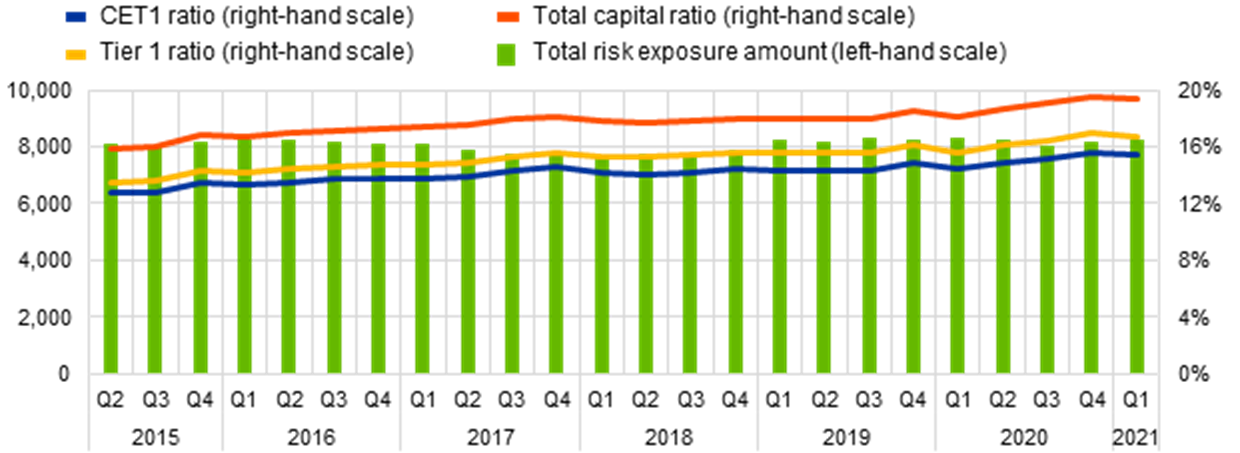
Source: ECB.
Chart 2
Capital ratios by country for the first quarter of 2021
(percentages)
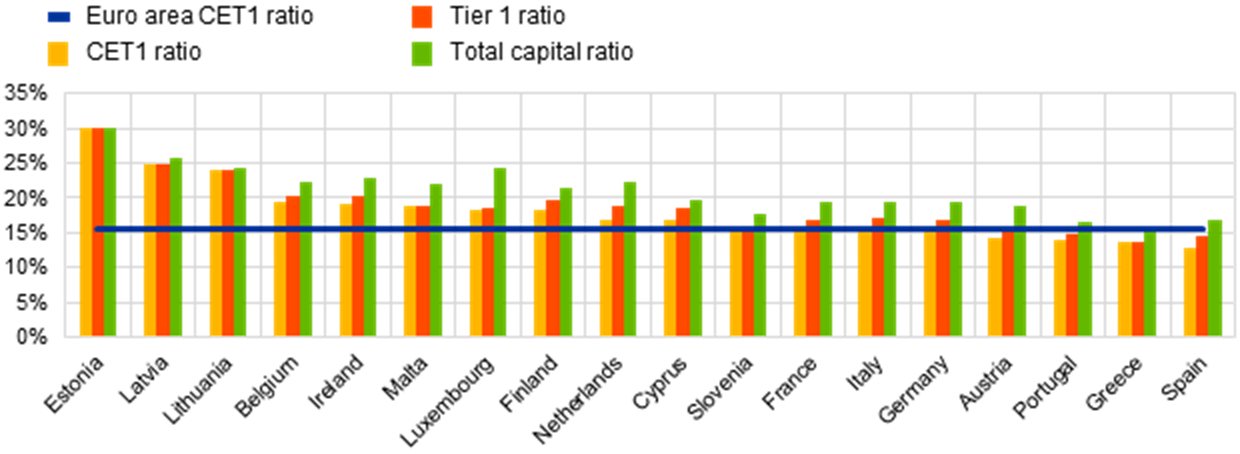
Source: ECB.
Note: Some countries participating in European banking supervision are not included in this chart, either for confidentiality reasons or because there are no significant institutions at the highest level of consolidation in that country.
Chart 3
Capital ratios by business model for the first quarter of 2021
(percentages)
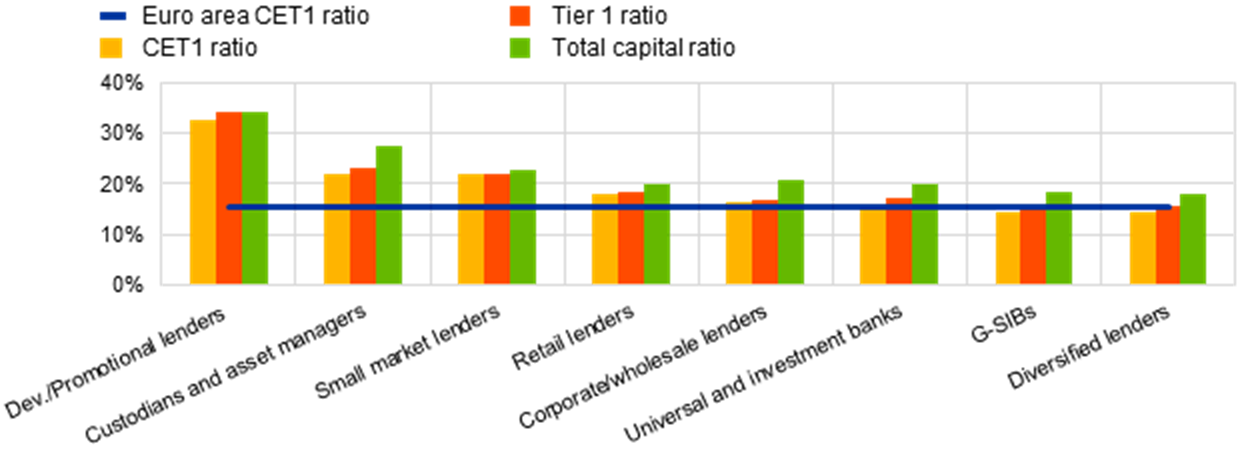
Source: ECB.
Notes: “Dev./promotional lenders” refers to development and promotional lenders; “Retail lenders” refers to retail and consumer credit lenders.
Asset quality
The aggregate non-performing loans (NPL) ratio decreased further to 2.54% in the first quarter of 2021, despite an increase in the stock of non-performing loans to €455 billion. This was the lowest level recorded since supervisory banking statistics were first published in the second quarter of 2015. At country level, the average NPL ratio ranged from 0.71% in Luxembourg to 25.17% in Greece. Across business model categories, custodians and asset managers reported the lowest aggregate NPL ratio (0.30%) and diversified lenders reported the highest (5.29%).
Chart 4
Non-performing loans by reference period
(EUR billions; percentages)
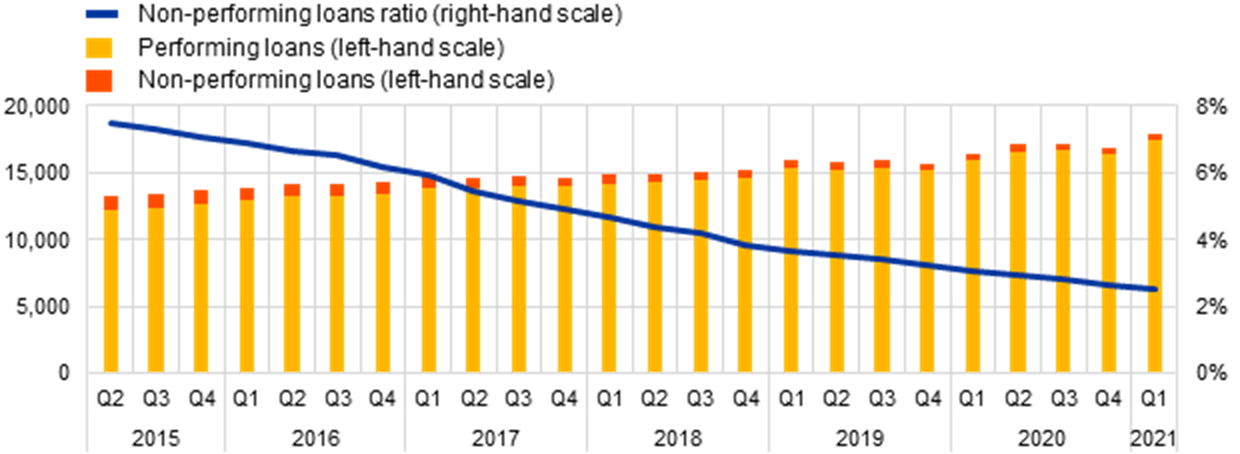
Source: ECB.
Chart 5
Non-performing loans ratio by country for the first quarter of 2021
(percentages)
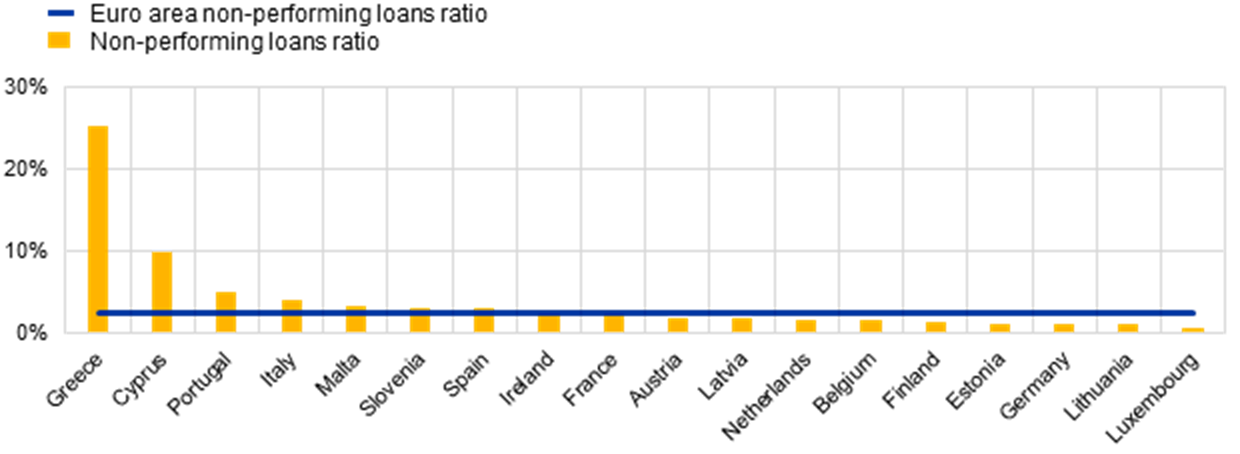
Source: ECB.
Note: Some countries participating in European banking supervision are not included in this chart, either for confidentiality reasons or because there are no significant institutions at the highest level of consolidation in that country.
Chart 6
Non-performing loans ratio by business model for the first quarter of 2021
(percentages)
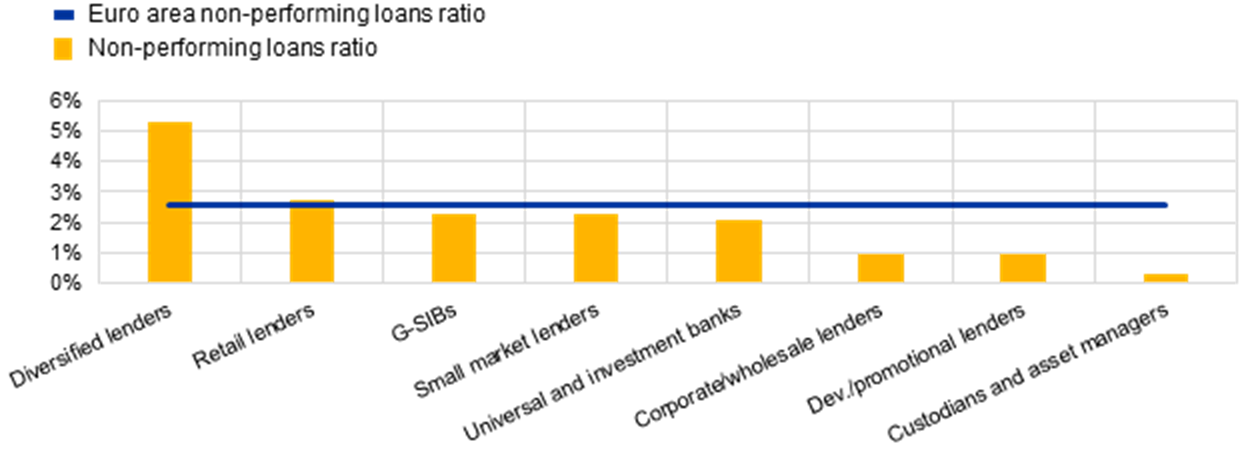
Source: ECB.
Notes: “Dev./promotional lenders” refers to development and promotional lenders; “Retail lenders” refers to retail and consumer credit lenders.
Return on equity
The annualised return on equity (RoE) increased considerably to an aggregate level of 7.21% in the first quarter of 2021, up from 1.21% a year earlier. This development was driven by an increase in aggregate net profits, mainly attributable to a significant increase in operating income and a decrease in impairments and provisions.
Chart 7
Return on equity and composition of net profit and loss by reference period
(EUR billions; percentages)
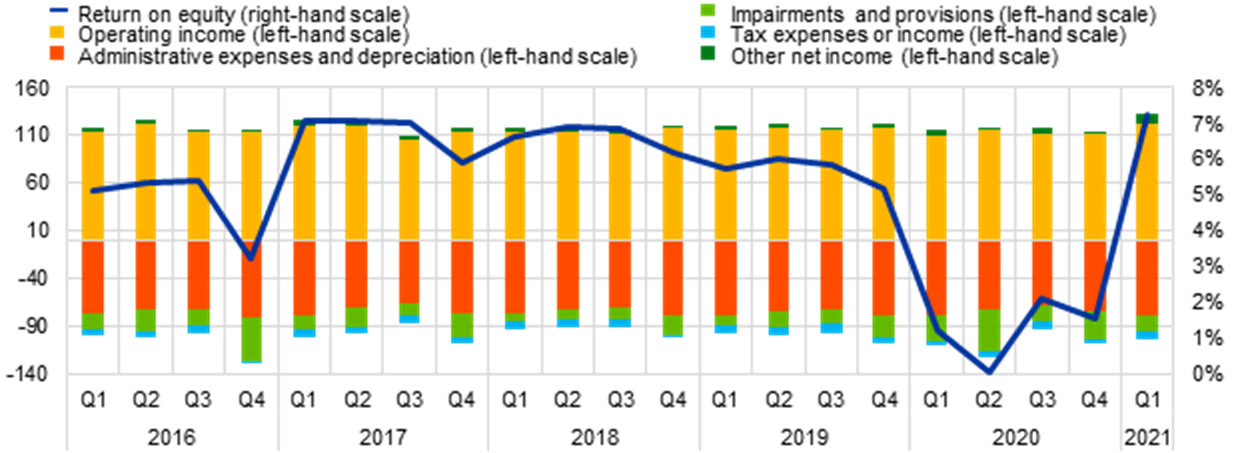
Source: ECB.
Liquidity
The aggregate liquidity coverage ratio rose to 172.73% in the first quarter of 2021, up from 171.68% in the previous quarter. Across SSM business model categories, global systemically important banks (G-SIBs) reported the lowest aggregate ratio (157.09%), while small market lenders reported the highest (284.92%).
Chart 8
Liquidity coverage ratio by reference period
(EUR billions; percentages)
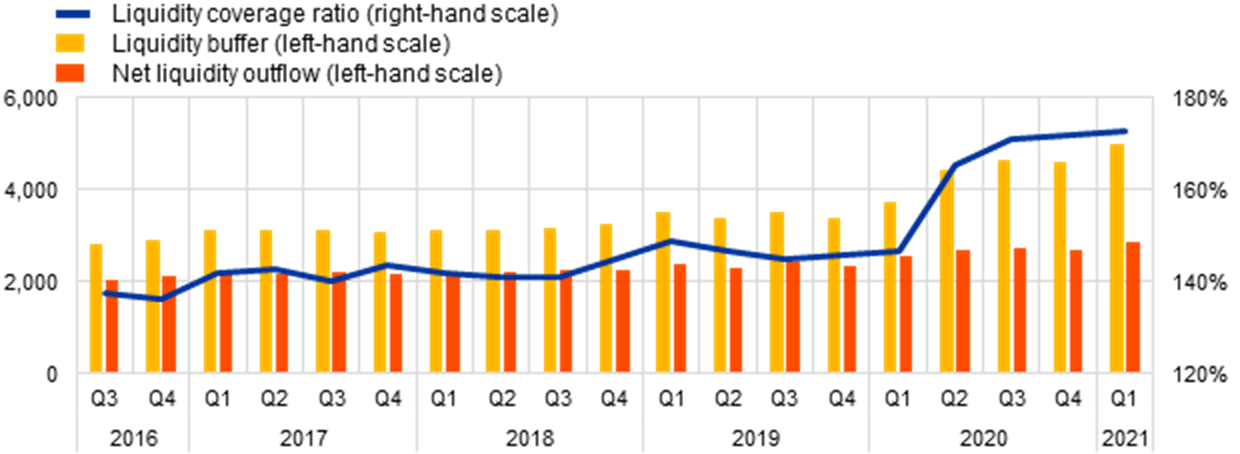
Source: ECB.
Chart 9
Liquidity coverage ratio by business model for the first quarter of 2021
(percentages)
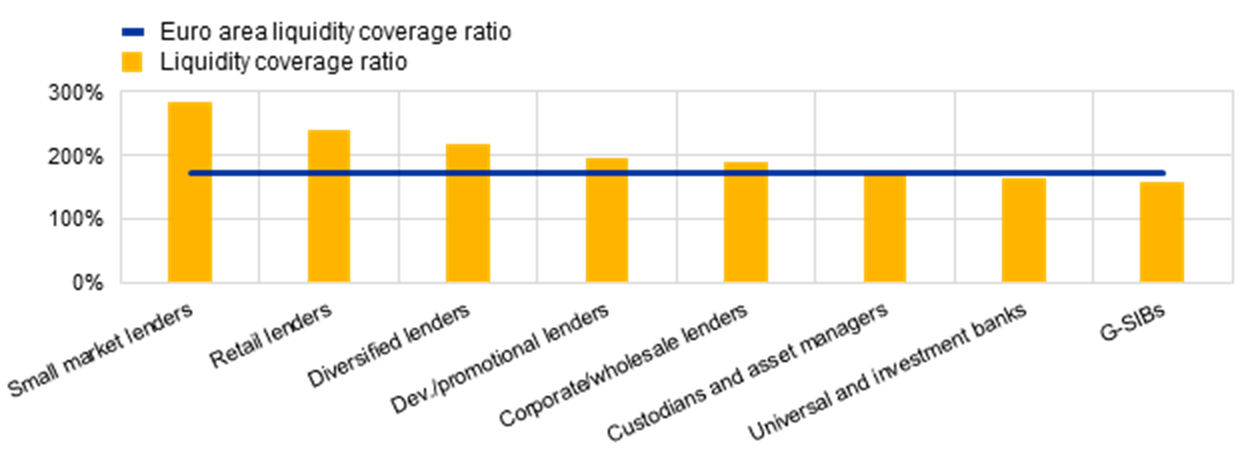
Source: ECB.
Notes: “Dev./promotional lenders” refers to development and promotional lenders; “Retail lenders” refers to retail and consumer credit lenders.
Loans and advances subject to COVID-19-related measures
In the first quarter of 2021 the total loans and advances subject to COVID-19-related measures decreased to €617 billion, down from €673 billion in the previous quarter. Non-expired loans and advances subject to EBA-compliant moratoria decreased to €178 billion, down from €282 billion in the fourth quarter of 2020. At the same time, newly originated loans and advances subject to public guarantee schemes increased to €375 billion (up from €340 billion in the fourth quarter of 2020). Other loans and advances subject to COVID-19-related forbearance measures (non-expired) stood at €64 billion at the end of the first quarter of 2021.
Chart 10
Loans and advances subject to COVID-19-related measures by reference period
(EUR billions)
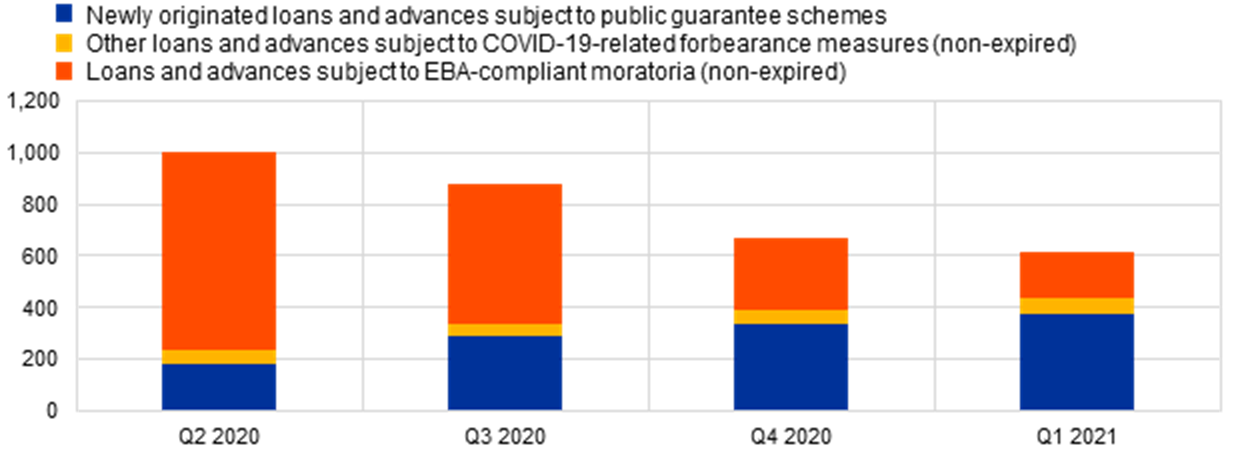
Source: ECB.
Factors affecting changes
Supervisory banking statistics are calculated by aggregating the data that are reported by banks which report COREP (capital adequacy information) and FINREP (financial information) at the relevant point in time. Consequently, changes in the amounts shown from one quarter to another can be influenced by the following factors:
- changes in the sample of reporting institutions;
- mergers and acquisitions;
- reclassifications (e.g. portfolio shifts as a result of certain assets being reclassified from one accounting portfolio to another).
For media queries, please contact Philippe Rispal, tel.: +49 69 1344 5482.
Notes
- The complete set of Supervisory banking statistics with additional quantitative risk indicators is available on the ECB’s banking supervision website.
Europese Centrale Bank
Directoraat-generaal Communicatie
- Sonnemannstrasse 20
- 60314 Frankfurt am Main, Duitsland
- +49 69 1344 7455
- media@ecb.europa.eu
Reproductie is alleen toegestaan met bronvermelding.
Contactpersonen voor de media

